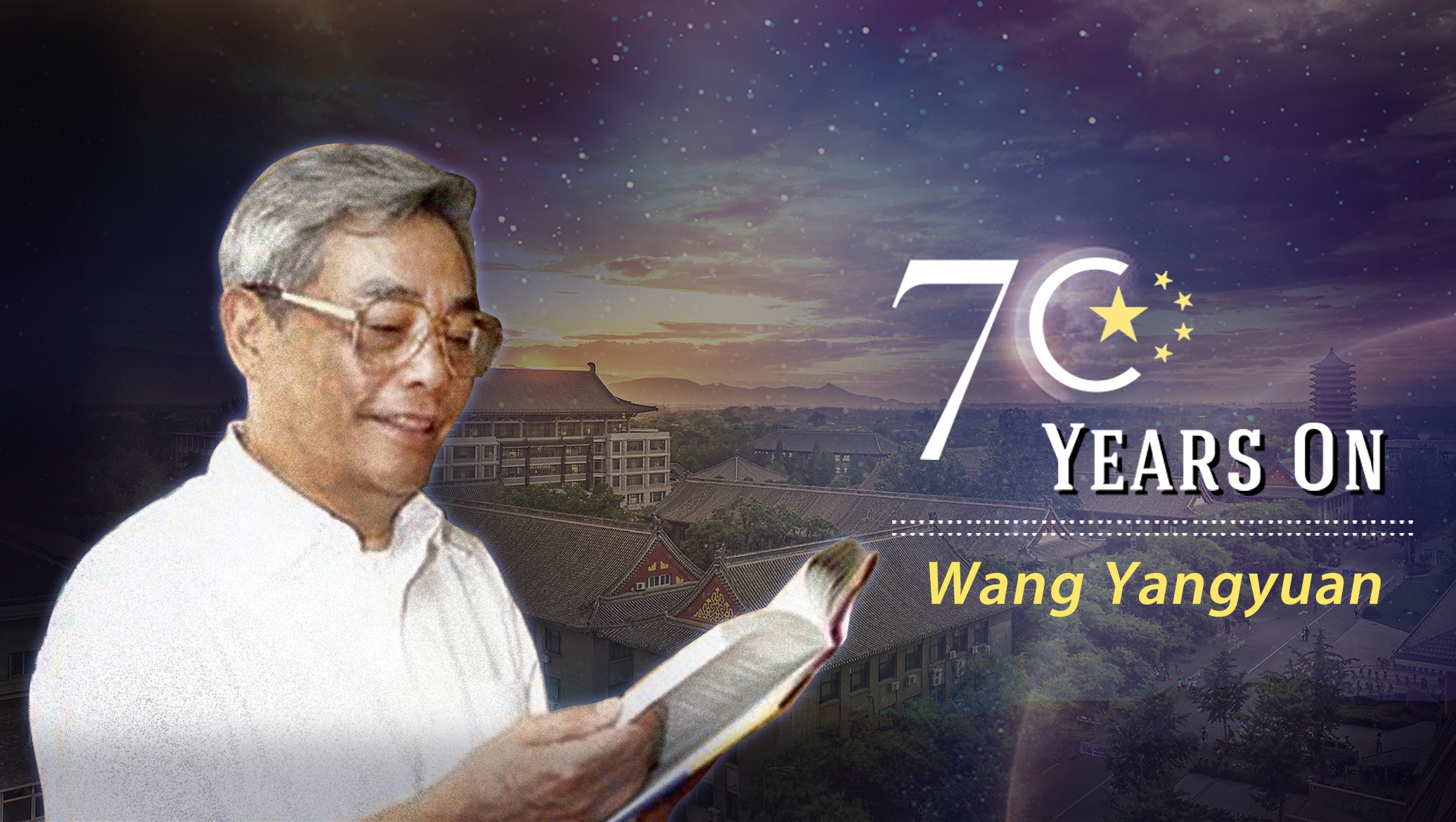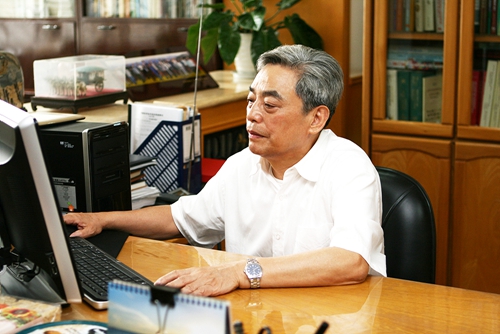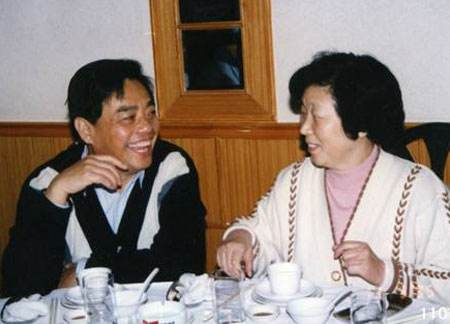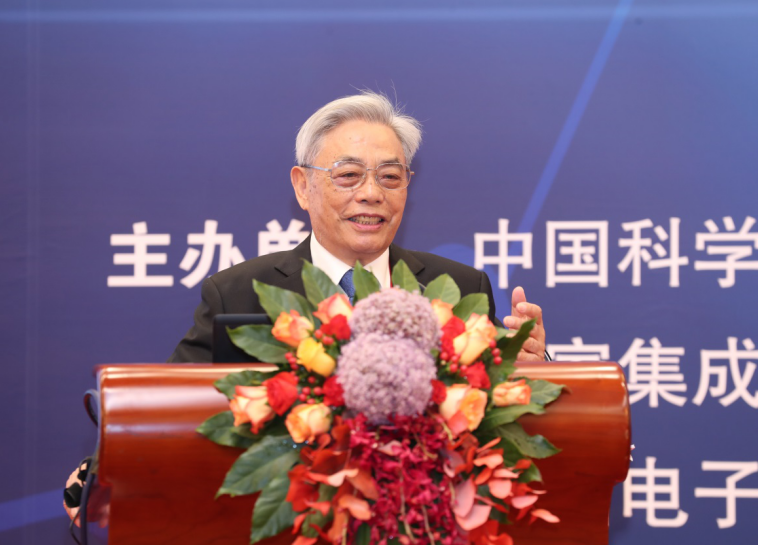[70 years on] Wang Yangyuan: Father of China’s study in Microelectronics
Nov 08, 2019
Editor’s Note: This story is part of a series of articles celebrating the 70th anniversary of the founding of the People’s Republic of China. Each article shines the spotlight on one PKUer who has made remarkable contributions to China’s recent development, highlighting not only the importance of their individual accomplishments, but also the significant impact Peking University has had on China’s development over the past 70 years.
Peking University, Nov. 8, 2019: As the People’s Republic of China celebrates its 70th anniversary, it’s worth taking a moment to examine to life and accomplishments of one of the key contributors to scientific progress in China: Wang Yangyuan. Wang’s contributions and dedication offer key lessons for students and professionals today.
 Wang Yangyuan
Wang Yangyuan
Wang Yangyuan is primarily known for his contributions to China’s microelectronic industry and has supported scientific advancement through a number of positions. He is a member of the Chinese Academy of Sciences, the former Dean of Peking University’s Institute of Microelectronics and the former Chief Scientist of Peking University’s Institute of Micro/nanoelectronics.
"Honesty" and "sincerity": a family tradition
In 1935, Wang was born in a working-class family in Ningbo, Zhejiang province. Since he was born on the first day of the lunar New Year, Wang’s grandfather named him Yangyuan, which, in Chinese, means “brightness” and “the beginning.”
In 1941, Wang started elementary school. He was an industrious student and earned straight-As. When he graduated from his primary studies, he was recognized as the best student in the district.
As a child, Wang learned honesty and sincerity from both his grandfather and father. These family virtues pushed Wang to value hard work and integrity and challenged him to live up to the examples set by his family members.
One story illustrates well the virtues Wang learned from his grandfather who worked as a traditional Chinese pharmacist in a traditional local Chinese medicine shop. When the shop owner offered to pass the shop to him out of gratitude, he declined without any hesitation as he didn’t want to accept easy money.
Similarly, Wang's father, Wang Minsheng, was also a careful and serious-minded person who set a good example for his son. He worked as an accountant at a stationery factory in Shanghai where, three years in a row, he never made any accounting mistakes. The auditors were so surprised of his accuracy and joked with him, "Wang, you made a mistake. The amount is three cents short this time." Wang, however, was confident in his math, and pointed out that if there were mistakes, they must have come from the auditors. It is only when someone is 100% sure of the work he did that he should say something seemingly rude like this.
As we look at the life path of Wang Yangyuan, we may well conclude that under great influence of such family tradition, Wang grew to be meticulous and pursue perfection, virtues proved essential for a scientist.
 Wang Yangyuan
Wang Yangyuan
Birth of the dream to become a scientist
From 1947 to 1953, Wang studied at Ningbo Secondary School where he developed good study habits which proved to be crucial for his future endeavors. During those years, he also decided on his lifelong goal: to become an honorable scientist and contribute to the nation.
In his Chinese class, Wang wrote an essay entitled "To be a Scientist-Yugeng on his way", expressing his desire to become an atomic physicist. Yugeng was the name he gave to himself at that time, meaning the constructor of the cosmos. The essay set off a heated discussion among Wang’s peers. Some called him "crazy" and some "stupid". They thought his idea was having bats in the belfry because for most students from small cities, it was something beyond their imagination. However, Wang couldn’t be more serious. He was clearly committed to his goal. Fortunately, his Chinese teacher was encouraging towards his dream and offered very positive feedback. Looking back on those days, Wang always paid homage to his teachers, referring to them as the "engineers of the soul" for fostering confidence and passion in the hearts of younger generations.
Dreams realized at PKU
In 1953, Wang was admitted to the Department of Physics at Peking University. In 1956, there was new, national focus on semi-conductors. Semi-conductors had been listed among the five most important fields of study based on their strategic importance. With new focus, knowledge of semi-conductors advanced rapidly among experts at Peking University. Those experts were among Wang’s professors and he gained solid base of knowledge as well as a comprehensive understanding of Microelectronics from their teaching. In 1958, Wang graduated from the Department of Physics and stayed at Peking University as a professor.
It was also at Peking University that Wang met Yang Fuqing, who was a top student in the department of Mathematics at the time. She proved to be his Miss. Right.
Although Wang and Yang deeply loved each other, the way towards eventually tying the knot was no plain sailing. There were days and nights that the loved couple were separated from each other. In early 1957, Yang was set to leave China to continue studying science in the Soviet Union. She had finished her Russian language course and was all set to leave Beijing. On the eve of departure, Yang and Wang made the commitment of a lifetime beside Weiming Lake. They promised each other that physical distance would never part their souls nor wear down their love.
In the autumn of 1960, Yang and Wang were married in a simple ceremony in front of the Department of Physics building at Peking University. Though life was hard back then, they enjoyed their married life thanks to each other’s company and the fun brought by science.
 Wang and Yang
Wang and Yang
Achievements as a scientist
While continuing his research at PKU, Wang was constantly searching for the field of study where his research could best contribute to China’s microelectronics industry.
Wang and his colleagues conducted long hours of research, studying into the early morning in the corner of the library of Peking University Changping Campus. After nearly half a year of careful study and discussions, a consensus was reached that memory stored on silicon would replace magnetic core memory because of its stability, reliability and potential for low-cost mass production. This new technology was bound to become influential in the industry and had the potential to supercharge development of MOS integrated circuit technology in China.
Under Wang’s leadership, the team tasked with this research was successful. In 1975, after nearly eight years of effort, China's first 1024-bit MOS DRAM became available, only four years later than its American counterpart. This was a milestone in the history of Microelectronics.
Researching day after nights with little rest took a physical toll on the researchers. Wang himself suffered from a sudden and uncontrollable loss of blood due to internal organ damage resulting from high-intensity work. Once he even passed out due to excessive blood loss.
Not only was Wang one of the pioneers leading research in the 1970s, but he continued his work on microelectronics in the 1980s and 1990s. That work was crucial for the development of the chip technology in China. It was also in that period that Wang travelled to the United States as a senior visiting scholar at the University of California, Berkeley.
Wang also acted as the major driving force in the development of the first big ICCAD (Integrated Circuit Computer Aided Design) system, the bed stone for integrated circuit design industry in China. In 2000, Wang founded the Semiconductor Manufacturing International Corporation, which helped China develop a world-class microelectronic industry. SMIC is now one of the leading foundries in the world, the most advanced and largest foundry on the Chinese mainland, the broadest in technology coverage, and the most comprehensive in semiconductor manufacturing services.
Over the past 50 years, Wang has published more than 300 research papers, 9 books, received patents for 62 inventions and made 20 major scientific and technological achievements. He cultivated over 100 graduate students and postdoctoral fellows altogether. He has won tens of awards, including the National Scientific Conference Award, the second prize of National Inventor’s Award, the second prize of National Science and Technology Progress Award, and the first Cai Yuanpei Award.
 Wang Yangyuan, leader in the microelectronics industry
Wang Yangyuan, leader in the microelectronics industry
Education: The key to a more prosperous future
After half a century of ups and downs, Wang is now in his 80s. He devoted over 60 years of his life to the progress of science. As he continues to nurture future generations of scientists, he continues to advocate for the importance of education. As he explained, “As long as human society continues, education is an eternal topic. And as long as the human species exists, learning is a major task.” In light of this statement, Wang now focus more on empowering new talents to pioneer future research.
Education goes hand in hand with hard work and dedication. Wang told his students that persistence is important than gift on the way to achieving scientific breakthrough. Opportunities are only for those who are ready to make sacrifice for the country. Wang also encouraged them to shoulder more social responsibilities.
Cultivating talents is not only the need of continuous progress in Microelectronics, but also the need of China’s strategic development.
Wang is an excellent example of what it means to be both scientist and teacher and a role model for those who hope to contribute to their country.
Written by: Qiu Kanghua
Edited by: Yan Shengnan, Erin Dunne



